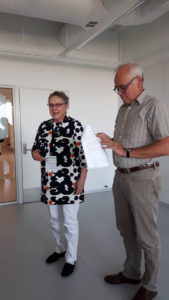Historical Anniversaries 2018 – Part One: Remembering the Victims of Holocaust
Normally I am writing on this blog about my work as researcher in vocational education and training (VET) and on learning experiences while working with practitioners in VET. However, as we all know, researchers and educators are not working in a societal vacuum. Therefore, issues of social awareness and social responsibility are always there to be considered and discussed. And historical anniversaries trigger such discussions in the media and in public debate. Yesterday, two historical anniversaries were ‘celebrated’ with such discussions – one at the international level and another one in my home country Finland. I will start with the Day for Remembering the Victims of Holocaust and the Nazi Regimes.
What does the the Day for Remembering (Gedenktag) stand for?
As an expatriate Finn living in Germany I have got used to the German culture of remembering the atrocities of the Nazi regime and showing solidarity to the victims. Many TV-channels show documentary films that give insights into the dark history and into the role of different societal actors who were involved. One of the peak points has been the 27th of January – the anniversary of the liberation of the concentration camp Auschwitz-Birkenau – the very place where the industrialisation of genocide and mass murders was brought to perfection.
Indeed, years and decades have passed from those dark days. Therefore, some people may think that one could leave that sad past behind. Some people may think that one could take a different view on the German military past – as if it were something separate from the genocide and mass murders of civilians of that time. And furthermore, migrants are coming to Germany from such areas in which the remembering of holocaust is not present.
This all has now been brought into discussion – once again – by the news updates and commentaries on the Day of Remembering. Below I have selected some examples that emphasise, how and why we need to keep the culture of remembering alive and ready to respond to whatever challenges.
The Museum Auschwitz-Birkenau as an advocate for the cause of the victims (also in the Internet)
My first example is the report of the leading German TV-channel ARD on the different activities of the Museum Auschwitz-Birkenau. Whilst the museum emphasises the importance making your own impressions there, on site, they also keep an eye on the discussions in the media and Internet. And, when they see something inappropriate (from the perspective of the victims), the intervene. Read more from the report:
Auschwitz-Museum in sozialen Medien – Anwalt der Opfer im Netz
Insights into historical facts as means to challenge the present-date antisemitism
The reason why I emphasise the active engagement of the museum in Auschwitz is the worrying tendency in Germany and elsewhere towards antisemitic violence and hatred vis-à-vis Jewish people. To some extent this is connected to the right-wing populist movement in Germany but to some extent also to migration from the Middle East or from Eastern Europe. Here it is not my intention to make false generalisations. Instead, I want to emphasise the importance of a culture of remembering and solidarity for the victims. To me the following contributions of the radio channel Deutschlandfunk bring this to the point:
Letzte Briefe von NS-Opfern vor dem Tod (Last letters from the victims of Nazis)
This report informs of an exhibition of the last letters of holocaust-victims to their relatives. It makes transparent the human beings and human lives that suddenly became victims of a brutal terror regime.
“Hass bekämpft man durch Bildung” (We have to fight against hatred with means of education)
This is an interview with the leading Jewish rabbi in Paris. He reflects on newer tendencies towards antisemitism, xenophobia and racism in Europe. But he also emphasises the achievements of intercultural education in promoting solidarity and understanding between people with different cultural backgrounds.
—
I think this is enough of this historical anniversary. To me it is important that the message of remembering and understanding is passed forward. As the Prime Minister of the German Federal State Thüringen, Bodo Ramelow has formulated it: “Never again means never again!” The lessons from the history have to be learned.
More blogs to come …

